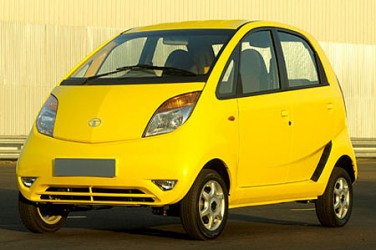Last weekend I was talking to some friends about my job, DFID's work with business and what my team does with the private sector. We were also talking about how several of us had read several articles about the rise of large companies from developing countries, such as this one in the Economist and how DFID is working with not just Western companies, but those from developing countries too. While businesses and in particular small and medium enterprises (SMEs) all over the globe have been badly hit by the financial crisis, several emerging and established companies based in developing countries are well placed to weather the current downturn. The example here is Indian company TATA, who recently launched the 'Nano', the world's cheapest car. Their knowledge of local markets has allowed them to trim off features that Indian families are willing to go without in order to swap their motorbike for a more family friendly car. And with plans to export the Nano to Europe it seems that, for TATA at least, the opening of global trade is seen as an opportunity not a threat.

Companies such as TATA have taken advantage of lower local operating costs as well as their understanding of local markets, and a decade of unprecedented growth in much of the developing world that, despite recent economic woes, has produced a substantial middle class in many countries. Companies based in developing countries also have the added advantage that the economy in their home market is generally still growing - though at a much slower pace than the past 5 years or so - while those of companies based in Europe, America or Japan are seeing national economic growth stagnate or even decline. In addition, national businesses such as Brazil's Petrobras are expanding, in this case thanks to the discovery of huge oil reserves off the East coast of that country, or Vail, another Brazilian company, buying parts of its Anglo-Australian rival Rio Tinto.
Of course business all over the world is facing huge obstacles over the next few years, however we should expect the survivors to include a clutch of companies from emerging markets that have weathered the storm and are ready to take advantage of greater trade opportunities offered once the global economy picks up. They are also taking their place at the table of discussions usually dominated by large MNCs from industrialised countries, and DFID is encouraging this participation.
One example of this is the Business Call to Action (BCtA), launched by the Prime Minister last year. DFID is looking to expand the participation of Southern business in the BCtA to take advantage of the experience of Southern business leaders in social investment as well as an understanding of the issues facing developing countries. Businesspeople from emerging market based companies are key to ensuring the success of this initiative. Business itself will be key in driving growth, the main route for people out of poverty, and by thinking now about how to maximise the beneficial impacts of the private sector in developing countries we can work with the private sector to ensure that when the world economy starts to recover, people in poor countries are among the first to benefit. Our team is preparing for the World Economic Forum on Africa in Cape Town in June where we hope to showcase initiatives from Southern based companies, who will join TATA and others in signing up to the BCtA. Watch this space for details of who gets on board!

1 comment
Comment by DFID Bloggers » Southern business is on the up Venture Capital and Entrepreneurship | Venture Capital And Entrepreneurship posted on
[...] Read more here: DFID Bloggers » Southern business is on the up [...]